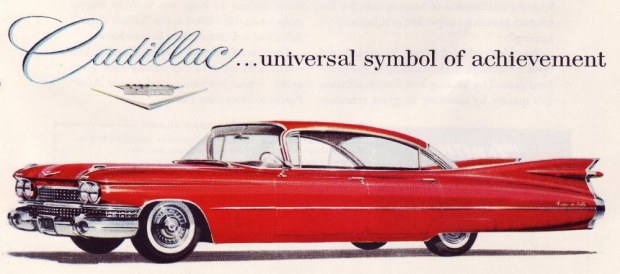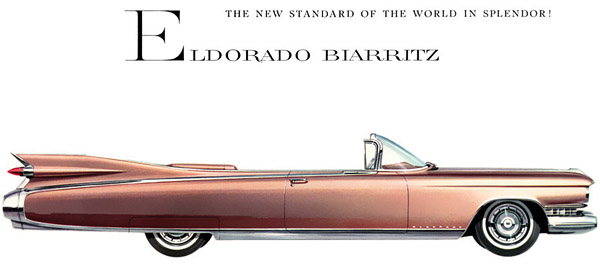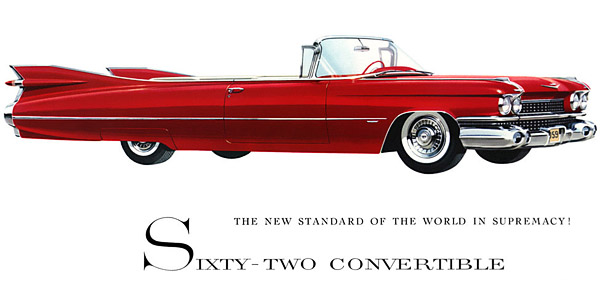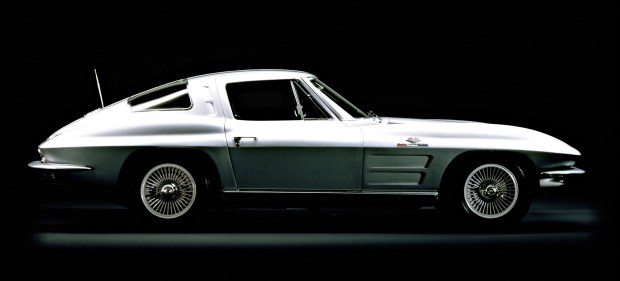
It wasn’t that long ago, as far as history goes, that the ideal car was a hulk of convenience, a bench-seated, chrome-plated, three-ton luxury missile. This ideal had many aspirants, but perhaps the one who most embodied it was the Cadillac, perhaps even the ’59 pictured. That’s more of a matter for vintage car enthusiasts, but it occurred to me that this particular car has a lot of things in common with Windows 7.
Bear with me here.
The pace of advancement in technology is such that ideas are often outpaced in just a few years. Formats, applications, and services pass by the wayside, having grown, bloomed, and withered at a speed which some years ago would be considered ludicrous. It’s a bit like the fins, wings, grilles, and other flourishes that increasingly decorated cars in the 50s. They sold, they were outdone, they were forgotten as the next version came along. And critically, at the time, the competition was between flourishes, not between cars. Yet at some point, that whole type of car would no longer be relevant. Are you picking up what I’m putting down?

It wasn’t long ago that when you said operating system, you meant that thing on your computer. Microsoft did a huge amount of work putting computers in every home, making them everyday devices, and to most people, they were the first visible evidence of such a thing as an OS. The “personal computer” as center of the home was an idea pioneered by Microsoft and pursued to a point which now is beginning to look impractical.
Improvements in miniaturization are essentially to be credited with all the consumer technology advances of the last quarter of a century (and more, though only the last 20 concern us for now). Part of Microsoft’s coup was making a compact machine that could do all the things you needed it to. But when you think about it, the boxes we were using then — 486s, LC-IIIs, and all the others — are the same size as the ones we have now. Sure, we have smaller PCs, but really, what’s become smaller is the die size of the processor, the cell size of the RAM, the width of a sector on the hard drive. We’ve been stuffing more into the same package for 30 years.
But recently (about ten years ago was, I would say, the tipping point) things started going the other direction. Instead of putting more power into the same size box, we took the same power and put it into a smaller box. And then a smaller box. And a smaller one. And today we have system-on-a-chips the size of your thumbnail, that perform at the same level as a high-end PC from 2001.
This is more than a competing model for Microsoft. It’s the end of the world as they know it.

Microsoft’s centralized PC was the future of computing in 1990, and it was the present of computing for a good stretch of time — from what we might call the golden age of the PC to the present. The news that Microsoft has sold 240 million copies of Windows 7 should come as no surprise. It’s a great operating system: powerful, secure, with a wealth of programs available and the remnants of a thousand learned lessons from the last 20 years of operating systems. Some of you, I understand, will have already skipped the rest of this article and are busy scribbling a reply to my little Windows eulogium here, but I hope the rest of you will have some patience as I approach my point.
I say, then, Windows 7 is a good operating system, and great as well, in the Alexander sense. And in twenty years, we’re going to look back on it as the last great one of its kind, the pinnacle of the desktop OS. Because Windows 7, like its predecessors, has everything, does everything, plays everything. Like those fabulous Cadillacs, it’s trimmed out with every possible widget and amenity. The only trouble is, while Microsoft has been building 6000-pound boats and indulging in fin wars, someone else has been working on this:

Small, light, fast, and to the point, the new breed of operating system is purposeful, specific, and if I may coin a term, infodynamic. Not only this, but the empowerment of the mobile phone, the tablet, the car, the toaster, to reach the internet, understand its location and purpose, and so on, comes at the expense of the centralized personal computer. The generalist PC isn’t going to disappear, exactly, but the desktop OS will have to become as streamlined as a mobile OS, a tablet OS — hell, a Roomba OS. The era in which people had only one computer, one operating system in their life is ending. The Cadillac era of computing is ending.
How much longer will the current hulks of computing convenience hold out? At least a few more years, but I suspect we’ll see some major changes in Windows 8, just as we saw some major concessions to iOS in this week’s Apple OS X update. The long term plans of these and other major companies are difficult to piece out, since as we all know, the necessities of the user, and the capability of his devices, are changing faster every year. But whatever the future holds, it holds a lot less of the kind of operating system on which I type these words.
Note: Please forgive my fast and loose car metaphors. Obviously there were more ostentatious vehicles (Chevy) but I thought Cadillac best represented my point. Also, at the bottom, there could probably also be like a Mini or something as well, and a big pickup truck. I thought I’d just err on the side of keeping it simple. Car people, calm thyselves.